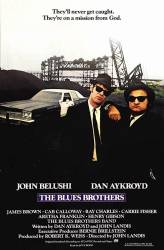Trivia: This movie set a long-standing Guinness World Record for the largest number of automobiles ever destroyed in a movie, 104, including 60 refurbished and reinforced police cars wrecked (most beyond repair) in the various chase scenes. This record held until the belated sequel, "Blues Brothers 2000," (1998) deliberately set the new record by wrecking one additional automobile for a total of 105.
Suggested correction: It possibly depends on what one counts as "destroyed." Sources suggest there were 104 cars destroyed in BB, with 105 in BB2000. The record has been broken several times since and now stands at 532. It'd be great to see evidence of the numbers for verification. whatculture.com/film/20-things-you-didn't-know-about-the-blues-brothers?page=12 www.startrescue.co.uk/news/top-10/the-10-films-that-destroyed-the-most-cars.
The trivia entry is mostly correct and doesn't need a correction. Just a word change to make it accurate. "Blues Brothers" (1980) did hold the record. 60 police cars were wrecked, but so were an additional 43 cars for a total of 103. "Blues Brothers 2000" beat their own record by 1 car. It seems person who made the entry found on the internet that "Blues Brothers" wrecked 60 cop cars and thought that was the record and assumed 61 was the new record.
Other mistake: There is an Ohio flag flying outside the hotel where they're going to play their big gig. (01:33:22)
Suggested correction: This isn't a mistake. The Ohio flag is one of at least 5 flags flown in a row, presumably the others being state flags. And this shot was filmed in Illinois, not Ohio. It's not uncommon for a place to fly multiple flags.
Character mistake: When Elwood tells his boss he is going to quit, his boss tells him he will call payroll and have them get his severance pay ready. While employees who resign do have final pay prepared (pro-rated pay, vacation pay, time owed in lieu, etc.) it would never be classified as "severance pay" if the employee resigned on their own accord. Severance pay is classified for employees who are terminated without cause, meaning no fault of their own. (00:43:10)
Suggested correction: This isn't entirely accurate, only what is most common. First, severance pay is not required by law, nor is paying for accrued PTO, so it's at the discretion of employers who can offer it to whomever they wish. An employer may offer a severance package for termination (with or without cause), retirement, or resignation. Often a severance package comes with certain conditions, such as the employee won't seek unemployment or work for a competitor, or may simply be money paid for PTOs.
Suggested correction: This never happened in the movie, Elwood didn't have a job.






